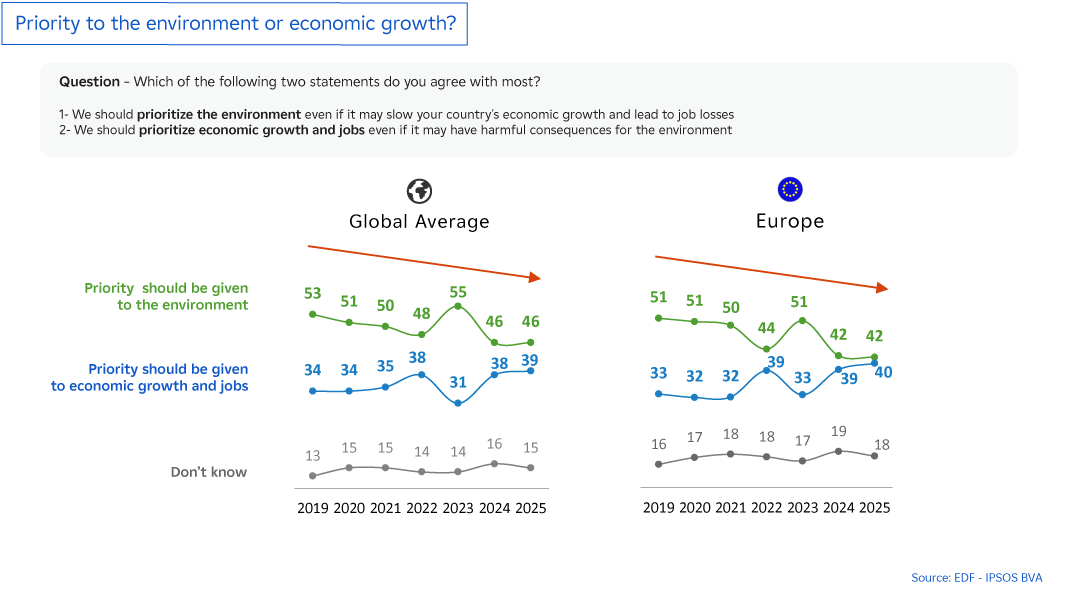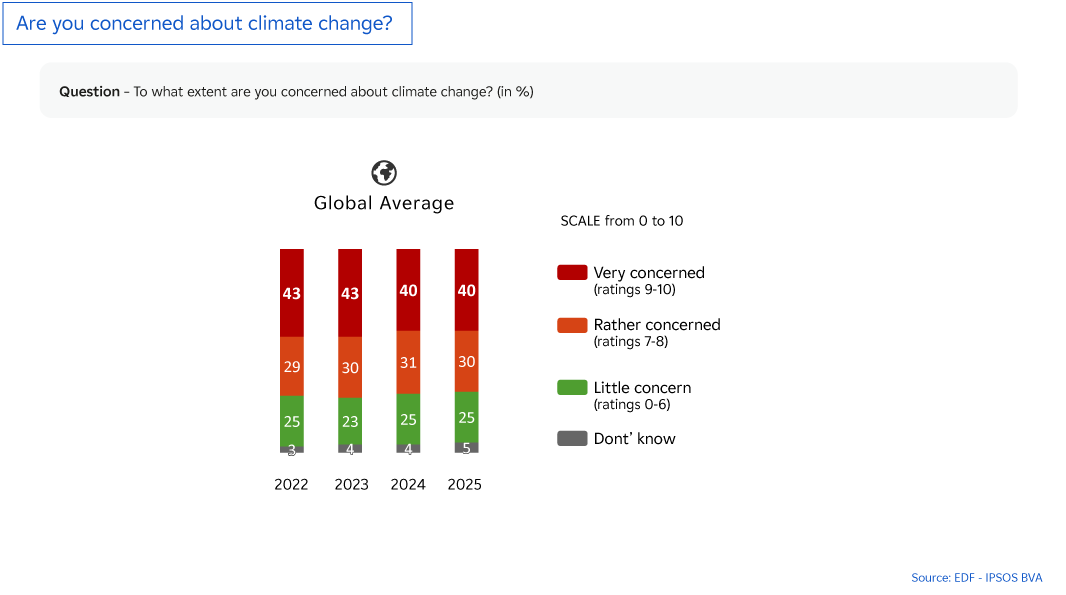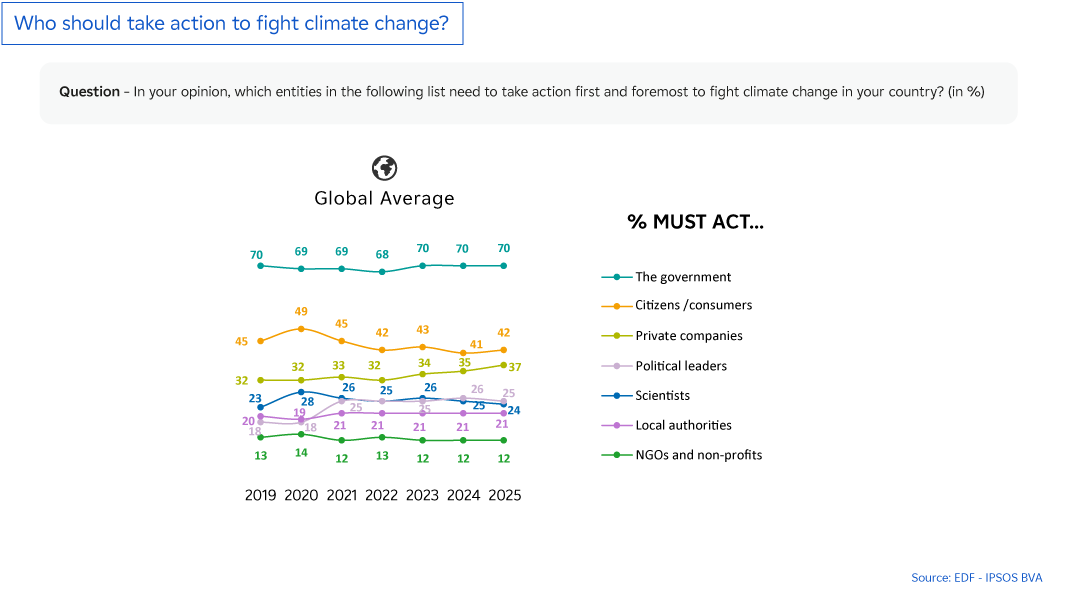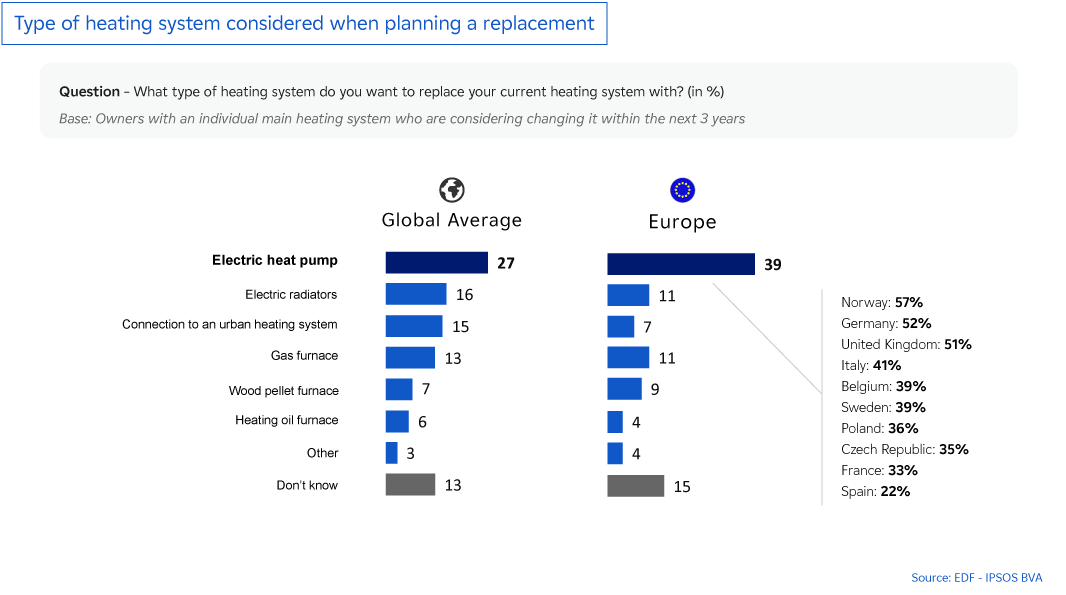Obs'COP 25, what can we learn from this international climate survey?
The Obs’COP 25 study confirms that climate debates worldwide have remained fixed since 2019. There is a global consensus on the existence of climate change and a stagnation in climate skepticism.
Rising temperatures and heatwaves are the two most convincing signs of climate change. However, concern is not increasing and remains relatively low: 40% of the global population say they are very concerned about climate change in 2025 compared to 43% in 2022.
Key Findings
-

Rising temperatures have ended the debate on the reality of climate change, which is no longer disputed. Across the planet, climate change is primarily global warming.
-

The steadiness of concern reflects a certain realism – we will have to live with this global warming – and initial adaptation strategies are emerging, particularly in the Global South: relocating to escape excessive heat.
-

Another possible source of discouragement: the perception in Europe that stakeholders are disengaging in 2025. Among economic players, car manufacturers, electricity providers, and farmers are seen as the most credible, even if they struggle to convincingly demonstrate their commitment.
-

Electrification of uses is widely viewed as progress, but its implementation among consumers elicits mixed reactions.
-

European reluctance toward policies promoting electric cars stems from several barriers: financial (purchase price), psychological (lack of range), and ideological (questioning environmental and climate benefits).
-

Conversely, heat pumps show potential for success as the leading alternative to fossil-fuel heating in Europe, though they require incentives and a stable regulatory framework. Heat pumps also enjoy a positive image among those most sensitive to environmental and climate issues.
The climate is losing ground in the face of economic, social and geopolitical priorities
Prioritization of the climate clearly fell across the globe between 2024 and 2025, going from 2nd to 4th place. This drop in ranking is relatively limited in percentage terms (from 45% to 43%), a sign that the actual share of the population mobilized by the issue has not diminished that much. It is not so much that the climate is losing importance, and more that other themes have moved ahead in the order of priorities, notably poverty and inequality, moving up from 3rd to 2nd place, behind the cost of living, which continues to top the list.
Over a longer period (from 2019 to the present), one question that puts prioritizing the environment up against the need for economic growth shows the environment dropping back quite sharply worldwide (-7 pts). Populations are now split into two equal camps, those prioritizing the environment versus those prioritizing economic growth and jobs.

Transcript
Priority to the environment or economic growth?
Question – Which of the following two statements do you agree with most? (in %)
1 - 1 - We should prioritize the environment even if it may slow your country's economic growth and lead to job losses
2 - We should prioritize economic growth and jobs even if it may have harmful consequences for the environment ?
EUROPE
| Priority should be given to the environment | Priority should be given to economic growth and jobs |
Don't know | |
| 2019 | 51 | 33 | 16 |
| 2020 | 51 | 32 | 17 |
| 2021 | 50 | 32 | 18 |
| 2022 | 44 | 39 | 18 |
| 2023 | 51 | 33 | 17 |
| 2024 | 42 | 39 | 19 |
| 2025 | 42 | 40 | 18 |
GLOBAL AVERAGE
| Priority should be given to the environment | Priority should be given to economic growth and jobs |
Don't know | |
| 2019 | 53 | 34 | 13 |
| 2020 | 51 | 34 | 15 |
| 2021 | 50 | 35 | 15 |
| 2022 | 48 | 38 | 14 |
| 2023 | 55 | 31 | 14 |
| 2024 | 46 | 38 | 16 |
| 2025 | 46 | 39 | 15 |
© Ipsos BVA | EDF – 2025
However, with the impact of rising temperatures, climate change has established itself as a reality
It is clearly the competition from other issues that is eclipsing concerns about the climate since respondents are almost unanimous about the reality of climate change: 90% of the world’s population recognize the existence of climate change, and 61% are even “certain” of it.
This reality is making itself felt across the planet, not through climate disasters (flooding, storms), but through the unstoppable rise in temperatures and more frequent episodes of extreme heat. For populations, climate change is primarily about climate warming.
Climate skepticism is no longer spreading…
The debate around the causes of climate change or its consequences seems to have stabilized. Skeptics have not capitalized on a trend in public opinion that is less favorable to the environment: they still represent around a third of the world’s population and remain concentrated in the same countries: Gulf States, Eastern Europe, Australia, Norway, USA… But even in the USA, the election of Donald Trump did not boost the number of skeptics (+1 pt).
…but concern isn’t growing either
Nevertheless, awareness of climate change among a majority of people, accentuated by the rise in temperatures, has not generated an increase in concern. The level of great concern worldwide remains stable (40%).

Transcript
Are you concerned about climate change?
Question – To what extent are you concerned about climate change? (in %)
GLOBAL AVERAGE
| % Very concerned (Ratings 9-10) |
% Rather concerned (Ratings 7-8) |
% Little concern (Ratings 0-6) |
Don't know | |
| 2022 | 43 | 29 | 25 | 3 |
| 2023 | 43 | 30 | 23 | 4 |
| 2024 | 40 | 31 | 25 | 4 |
| 2025 | 40 | 30 | 25 | 5 |
© Ipsos BVA | EDF – 2025
Adaptation strategies are already in place
Concern is not growing, whereas a large share of the world’s population (32%, but more than half of the population in Colombia, Nigeria, Turkey, Indonesia, the Emirates and 63% in India) expect to be forced to leave their home in the next 10 years, as a result of climate change. The reasons cited are, in 7 out of 10 cases, extreme heat or water shortages. The prospect of change is not being taken lightly: those who are certain of having to leave their current place of residence are very concerned about climate change.
High expectations of governments in terms of climate action
To fight climate change, governments are the players most generally expected to take action by 70% of the world’s population. The other players, such as private companies, local politicians or consumers, were mentioned by fewer than 43%.
Across the world, and particularly in Europe, a sense of decreased commitment has dominated for the past year, on the part of all players.
Among the economic players, farmers, carmakers and electricity providers seem to be the most credible: between 57% and 56% of our global sample recognize their involvement in the ecological transition. Other sectors such as digital technology, banks etc. receive less recognition for their efforts.

Transcript
Who should take action to fight climate change?
Question – In your opinion, which entities in the following list need to take action first and foremost to fight climate change in your country? (in %)
GLOBAL AVERAGE
| The government | Citizens / consumers |
Private companies | Political leaders | Scientists | Local authorities | NGOs and non-profits |
|
| 2019 | 70 | 45 | 32 | 18 | 23 | 20 | 13 |
| 2020 | 69 | 49 | 32 | 18 | 28 | 19 | 14 |
| 2021 | 69 | 45 | 33 | 25 | 26 | 21 | 12 |
| 2022 | 68 | 42 | 32 | 25 | 25 | 21 | 13 |
| 2023 | 70 | 43 | 34 | 25 | 26 | 21 | 12 |
| 2024 | 70 | 41 | 35 | 26 | 25 | 21 | 12 |
| 2025 | 70 | 42 | 37 | 25 | 24 | 21 | 12 |
© Ipsos BVA | EDF – 2025
Consumers lack commitment
Not all consumers show signs of paying attention to the impact their consumption has on the climate. Take three symbolic habits: daily car use, daily meat consumption and taking a plane more than once a year. Only meat consumption dropped (slightly) worldwide between 2021 and 2025 (from 38% to 36%). Meanwhile, use of cars and planes has not decreased, regardless of geographic area.
When it comes to the other pro-climate habits tested, and especially the ones that really count in relation to the climate, around one quarter of consumers systematically engage in them, and those are the more mobilized individuals.
Acceptance of climate policies is dropping
Within a context of great concern about purchasing power, there is increasing resistance to restrictive climate policies. This is particularly true when it comes to measures concerning transport, for example the ecological penalty, which receives no more than 57% support on a global scale (-6 points vs. 2021). The ban on internal-combustion-engine vehicles by 2035 generates even less support: only 37% of Europeans are in favor (-9 points vs. 2021).
A majority support electrification
The world’s population supports electrification. This is one of the survey’s key findings: 68% of our sample in 30 countries are in favor of replacing fossil fuels with electricity in transport, heating or industry. Europeans are no exception to the rule: 62% are in favor.
The climate value of the transition to electricity is obvious for 64% of Europeans, but even more so on a global scale (72%), notably because the southern countries doubtless see it as a means to fight air pollution at the same time.
To support the electricity production required for this transition, people choose solar panels (84% globally), hydroelectric dams (73%), and onshore (72%) or offshore (73%) wind farms. In Europe, nuclear power has become popular again, notably in Poland and the Czech Republic where 70% of citizens are in favor (+24 points in Poland since 2021). The return to grace of this energy source, albeit relative, is spectacular in Germany (+15 pts) and especially in Italy (+21 pts) and Norway (+23 pts).
Attitudes to the electric car differ according to geographic areas
Most of the world’s citizens react positively to the development of the electric car (68%), which is in line with their desire to see increased electrification. The enthusiasm evident in the Southern countries contrasts with a chillier response among Europeans, only 55% of whom view the EV boom favorably (vs. 62% for electrification in general). In Germany and Belgium, the level of support is at 51%, and dips beneath the 50% bar in France, Poland and the Czech Republic.
Cost, the main barrier to electric vehicles
European reluctance about the policy of promoting electric vehicles stems from three obstacles:
- Financial: electric vehicles still suffer from an image of expensiveness, with price being the main obstacle to purchase (53% in Europe – source: Obs’COP 2024), whereas there is an increasingly diverse range of offers under 25,000€. Moreover, there is a lack of awareness of the fact that Total Cost of Ownership for EVs is lower than for internal-combustion-engine vehicles.
- Psychological: fears around loss of autonomy linger among drivers. A lack of autonomy (40%) and a lack of charging stations (25%) feature among the key obstacles to purchase, just behind the price (source: Obs’COP 2024). This phenomenon is especially observed among older people. However, the rate of installation of public charging stations is accelerating.
- Ideological: the environmental impact of EVs is questioned given that only 57% of Europeans believe that the electric car is an asset in fighting climate change, as opposed to 72% worldwide. However, the environmental and climate benefits of EVs are undeniable (CO₂, noise, pollution, comfort).
Within this context, the electric vehicle has even less appeal this year: only 11% of Europeans would consider purchasing a 100% electric vehicle, i.e. a 2-point drop vs. 2024. In contrast, internal-combustion-engine vehicles are regaining popularity: 42% of Europeans would prioritize an internal-combustion-engine vehicle, i.e. an 8-point increase compared to 2024. This trend can also be observed on a global scale.
The heat pump, the preferred heating method for Europeans
Unlike the electric vehicle, the heat pump has attracted a lot of interest, a sign of potential success. This other lever of decarbonization is well-known in Europe (91%), and in North America (75%).
Among its prospective customers — homeowners thinking of changing their individual heating system in the next three years — the heat pump is the system most widely considered: 39% of Europeans would opt for the heat pump from among six other options. The heat pump has even more appeal among individuals who are very sensitive to environmental and climate issues.
In Europe, the prospect of energy savings (67%) and financial incentives (56%) are the two most convincing levers by far. Within a context of heatwaves and temperatures rises, the dual heating/air-conditioning function also appeals to 33% of Europeans.
But once again, the purchase cost continues to be an obstacle: 44% of Europeans not considering this system view it as too expensive, and 22% think that the financial aid available is insufficient. The setting up of financial incentives and the guarantee of a stable regulatory framework therefore appear to be vital factors in encouraging its adoption. Moreover, doubts about its efficiency during cold weather (25%) were also pointed out, but neither negative word-of-mouth nor the lack of qualified installers seem to be dissuasive, showing that the heat pump has overcome its past negative feedback.

Transcript
Type of heating system considered when planning a replacement
Question – What type of heating system do you want to replace your current heating system with? (in %)
Base: Owners with an individual main heating system who are considering changing it within the next 3 years
GLOBALE AVERAGE
| Global Average | Europe | |
| Electric heat pump | 27 | 39 |
| Electric radiators | 16 | 11 |
| Connection to an urban heating system | 15 | 7 |
| Gas furnace | 13 | 11 |
| Wood pellet furnace | 7 | 9 |
| Heating oil furnace | 6 | 4 |
| Other | 3 | 4 |
| Don't know | 13 | 15 |
Details for Europe
- Norway: 57%
- Germany: 52%
- United Kingdom: 51%
- Italy: 41%
- Belgium: 39%
- Sweden: 39%
- Poland: 36%
- Czech Republic: 35%
- France: 33%
- Spain: 22%
© Ipsos BVA | EDF – 2025

